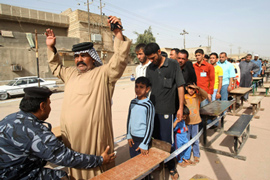Vote count begins in Iraq election
Authorities impose overnight curfew in Baghdad after poll marred by series of explosions.

Initial reports indicated that dynamite was used to blow up the building, the interior ministry official said.
Polling stations targeted
Al Jazeera’s Mike Hanna, reporting from Baghdad, said the series of mortar attacks and blasts from improvised explosive devices overshadowed the start of voting.
“The apparent target were polling stations though none was directly damaged in any of the attacks. After that very dangerous start, voting proceeded fairly smoothly,” he said.
| special report |
 |
“At this point it’s still unclear exactly how large the turnout was, but reports from most areas indicate that the turnout was very satisfactory as far as those who want to see a successful poll process go are concerned.”
Nouri al-Maliki, the incumbent Iraqi prime minister, whose State of Law coalition is claiming credit for improved security since the peak of sectarian warfare in 2006-07, dismissed Sunday’s attacks as “just noises to scare the Iraqi people from voting”.
“But I know the Iraqi people. They have conviction. When there is a challenge, they persevere, and you will see for yourselves the large number of people that come out to vote.”
International reaction
Elsewhere, Al Jazeera’s Zeina Khodr, reporting from Sulaymaniyah, in Kurdistan region, said a member of the provincial council of Mosul, Qusay Abbas, was shot dead in the disputed area of Shabak.
|
|
| Iraq poll analysis with Al Jazeera’s Jasim Azawi |
“Mosul is a tense city and there is still no real political reconciliation between Arabs and Kurds,” she said.
“Today we are seeing a lot of Arabs turning up at the polling stations who want to be part of the political process, from which they have been away for many years, which has weakened them and given Kurds more clout in the Iraqi parliament.”
The election was supervised by as many as 120 international monitors, with a number of foreign embassies providing staff to act as observers.
The European Union, France, the UK and the US all congratulated the people of Iraq after the vote.
Barack Obama, the US president, also commended voters and Iraqi security forces for their efforts to participate in the election despite the violence.
“I have great respect for the millions of Iraqis who refused to be deterred by acts of violence, and who exercised their right to vote today,” Obama said in a statement.
“Their participation demonstrates that the Iraqi people have chosen to shape their future through the political process.”
Secular agendas
Voters were choosing between a broad range of parties and coalitions and no bloc is expected to win a majority.
After the last national election in 2005, it took the various political parties about five months to agree on a prime minister and for a cabinet to be approved.
Our correspondent, Mike Hanna, said: “In the past, people have tended to vote along sectarian lines. But now, no governing coalition can come to power unless it has the widest possible breadth of support.
 |
| Around 19 million people were eligible to vote in the election [AFP] |
“So political parties and coalitions have been fighting a campaign not on sectarian issues, but on the wider issues of Iraqi nationalism.”
Al-Maliki is taking on political opponents tapping into exasperation with years of conflict, poor public services and corruption, and hoping to gain support from a once-dominant Sunni minority.
Iyad Allawi, a former prime minister who heads the cross-sectarian, secularist Iraqiya list, has already complained about irregularities in early voting, setting the scene for possible challenges to the election’s integrity.
Hasan Salman, a representative of the Iraqi National Alliance (INA) – the successor of the United Iraqi Alliance, which has dominated the government since the December 2005 elections – also claimed voting irregularities.
“The government is using its power to steer things to its interest,” he told Al Jazeera.
“We are scared the result will be fraudulent. There are 19 million Iraqis qualified to vote, but there are 25 million voting slips, and we still have not received an answer why extra 6 million slips were printed.”
The Iraqi electoral commission is to announce preliminary results on March 10-11, based on votes from about 30 per cent of the polling stations.
The supreme court would then certify the poll results, after hearing appeals, within about a month of the election.